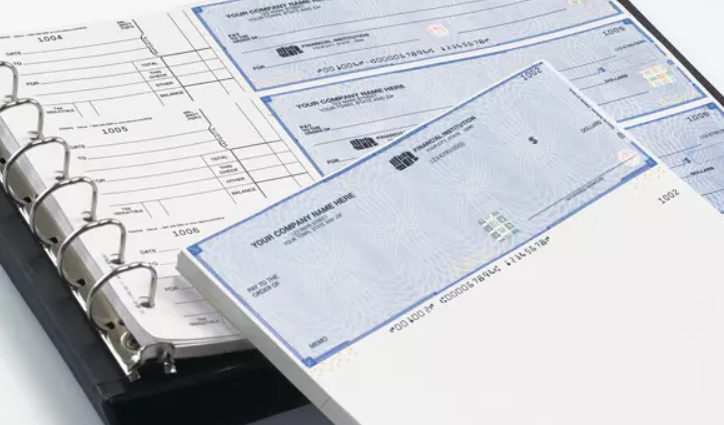In an era dominated by digital payments and electronic transactions, it might seem like paper checks are becoming obsolete. However, for businesses, checks remain an indispensable tool. This comprehensive guide delves into the reasons why checks are still crucial for business operations, their benefits, security features, and best practices for using them effectively.
The Importance of Checks for Businesses
- Control and Security: Checks,and especially high security checks, provide a higher level of control and security compared to many electronic payment methods. Each check requires a manual signature, adding a layer of authorization that helps prevent unauthorized transactions. Additionally, businesses can void or stop payment on checks if necessary, providing an extra measure of control over their finances.
- Record Keeping and Documentation: Checks create a tangible paper trail that is invaluable for bookkeeping and auditing purposes. Each issued check generates a physical record that includes the payee, amount, date, and purpose of the transaction. This detailed documentation is crucial for maintaining accurate financial records, simplifying tax preparation, and facilitating audits.
- Professionalism and Credibility: Using business checks conveys professionalism and credibility. Customized checks featuring a company’s logo and contact information can strengthen business relationships by reinforcing a professional image. Clients, vendors, and partners often appreciate the tangible, formal nature of a check.
- Payment Flexibility: Checks offer flexibility for various types of payments. They can be used for payroll, vendor payments, utilities, rent, and other expenses. For many transactions, particularly large or recurring payments, checks are more practical and preferred over electronic methods due to lower transaction fees and better control.
- Vendor Preferences: Many vendors and suppliers still prefer receiving payments by check. This is especially true for small businesses and traditional industries where electronic payment systems are less prevalent. Checks ensure that businesses can accommodate these preferences and maintain good relationships with their vendors.
Benefits of Using Business Checks
- Reduced Transaction Costs: Compared to credit card payments and wire transfers, checks often incur lower transaction fees. This can result in significant cost savings, especially for businesses that process a high volume of transactions.
- Easier Payment Tracking: Each check issued is recorded in a check register, making it easier to track payments and manage accounts payable. This tracking helps businesses stay organized and ensures that all expenses are accounted for.
- Enhanced Fraud Prevention: Business checks are equipped with various security features that help prevent fraud. These features include watermarks, holograms, heat-sensitive ink, and microprinting. Such security measures make it difficult for counterfeiters to replicate checks.
- Legal Proof of Payment: Checks serve as legal proof of payment. In case of disputes, a canceled check provides evidence that a payment was made, protecting businesses from claims of non-payment.
Security Features of Business Checks
- Watermarks: Watermarks are embedded into the check paper during manufacturing and are visible when held up to the light. They add a layer of security by making it difficult for counterfeiters to duplicate the check.
- Holograms: Holograms are three-dimensional images that change appearance when viewed from different angles. They are highly effective in preventing forgery due to their complexity and difficulty in replicating.
- Heat-Sensitive Ink: Heat-sensitive ink reacts to body heat by disappearing or changing color when touched. This feature helps verify the authenticity of a check, as it is challenging to reproduce with standard printing methods.
- Microprinting: Microprinting involves printing extremely small text on the check, which appears as a solid line to the naked eye but is readable under magnification. This feature is difficult to copy and helps detect counterfeit checks.
- Security Borders and Backgrounds: Intricate borders and complex background patterns on checks deter alterations. Any attempt to tamper with these features results in visible damage, making fraudulent activities easier to spot.
Best Practices for Using Business Checks
- Secure Storage: Store checkbooks and blank checks in a secure location, such as a locked drawer or safe, to prevent unauthorized access. Limit access to checks to authorized personnel only.
- Regular Reconciliation: Reconcile your bank statements with your check register regularly to ensure all transactions are accounted for. This practice helps detect and address discrepancies or unauthorized transactions promptly.
- Detailed Record Keeping: Maintain detailed records of all issued checks, including the check number, date, payee, amount, and purpose. This documentation is crucial for accurate bookkeeping and financial management.
- Implement Approval Processes: Establish an approval process for issuing checks, particularly for large payments. Requiring multiple signatures or approvals for significant amounts adds an extra layer of security and control.
- Monitor Check Stock: Keep track of your check inventory to avoid running out of checks unexpectedly. Reorder checks in advance to ensure you always have an adequate supply.
- Use Pre-Numbered Checks: Using pre-numbered checks helps maintain a sequential record, making it easier to identify missing or stolen checks. This practice also aids in reconciliation and auditing.
The Role of Checks in Modern Business Operations
Despite the growing prevalence of electronic payments, checks continue to play a vital role in modern business operations for several reasons:
- Compatibility with Traditional Systems: Many businesses and industries still rely on traditional payment systems where checks are the standard. Checks ensure compatibility with these systems, facilitating seamless transactions.
- Versatility in Payment Types: Checks can be used for a wide range of payments, including payroll, vendor payments, rent, and utilities. This versatility makes them a practical tool for businesses of all sizes.
- Customer and Vendor Trust: Checks build trust with customers and vendors by providing a clear and tangible method of payment. They reinforce the perception of reliability and professionalism.
- Legal and Regulatory Compliance: In some jurisdictions, checks are required for specific types of transactions to ensure transparency and accountability. Using checks helps businesses comply with these legal and regulatory requirements.
- Contingency Planning: Checks provide a reliable backup payment method in case of electronic payment system failures or cyber-attacks. Having checks on hand ensures that businesses can continue operations without interruption.
Conclusion
Business checks remain an indispensable tool for financial management, offering control, security, professionalism, and flexibility. Despite the rise of digital payment methods, checks provide unique benefits that make them essential for many businesses. Whether used for payroll, vendor payments, or large transactions, checks continue to play a crucial role in the modern business landscape, supporting efficient and secure financial management.












